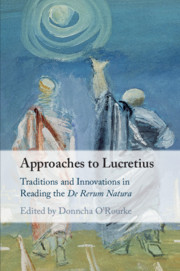Book contents
- Approaches to Lucretius
- Approaches to Lucretius
- Copyright page
- Contents
- Figures
- Notes on Contributors
- Preface
- Abbreviations
- Introduction
- Part I The Text
- Part II Lucretius and his Readers
- Part III The Word and the World
- Part IV Literary and Philosophical Sources
- Chapter 8 Arguing over Text(s): Master-Texts vs. Intertexts in the Criticism of Lucretius
- Chapter 9 Lucretius and the Philosophical Use of Literary Persuasion
- Chapter 10 The Rising and Setting Soul in Lucretius, De Rerum Natura 3
- Part V Worldviews
- Works Cited
- Index Locorum
- Index Rerum
Chapter 8 - Arguing over Text(s): Master-Texts vs. Intertexts in the Criticism of Lucretius
from Part IV - Literary and Philosophical Sources
Published online by Cambridge University Press: 25 June 2020
- Approaches to Lucretius
- Approaches to Lucretius
- Copyright page
- Contents
- Figures
- Notes on Contributors
- Preface
- Abbreviations
- Introduction
- Part I The Text
- Part II Lucretius and his Readers
- Part III The Word and the World
- Part IV Literary and Philosophical Sources
- Chapter 8 Arguing over Text(s): Master-Texts vs. Intertexts in the Criticism of Lucretius
- Chapter 9 Lucretius and the Philosophical Use of Literary Persuasion
- Chapter 10 The Rising and Setting Soul in Lucretius, De Rerum Natura 3
- Part V Worldviews
- Works Cited
- Index Locorum
- Index Rerum
Summary
There is a long history in Lucretian scholarship of finding conflict in the DRN between its philosophical content and its poetic form. Recent criticism has emphasized rather how the poem’s poetic form complements its Epicurean message. This chapter argues for important differences between literary and philosophical approaches to the poem, in particular with regard to its relationship with other texts, in order to identify some important differences in common modes of reading the poem. The chapter examines a ‘master-text’ model of reading, in which the DRN is related in strong fashion to another text on which it is dependent. The precise nature and identity of this ‘master-text’ can vary, according to the purpose or use to which the DRN is put. The approach of such ‘master-text’ readings is strikingly different from the dominant intertextual mode. In the examples of intertextual reading examined, the relationship to the other text is not one of subordination, but a tool used by the DRN to serve a particular function within the poem itself. The modes of reading explored in this chapter can lead to real differences in interpretation: e.g., on the end of the DRN, or on how uncompromising or sympathetic we should view certain parts of the poem. One important consequence is the need to acknowledge the differences in our reading practices and theoretical assumptions.
Keywords
- Type
- Chapter
- Information
- Approaches to LucretiusTraditions and Innovations in Reading the <I>De Rerum Natura</I>, pp. 157 - 176Publisher: Cambridge University PressPrint publication year: 2020
- 2
- Cited by

